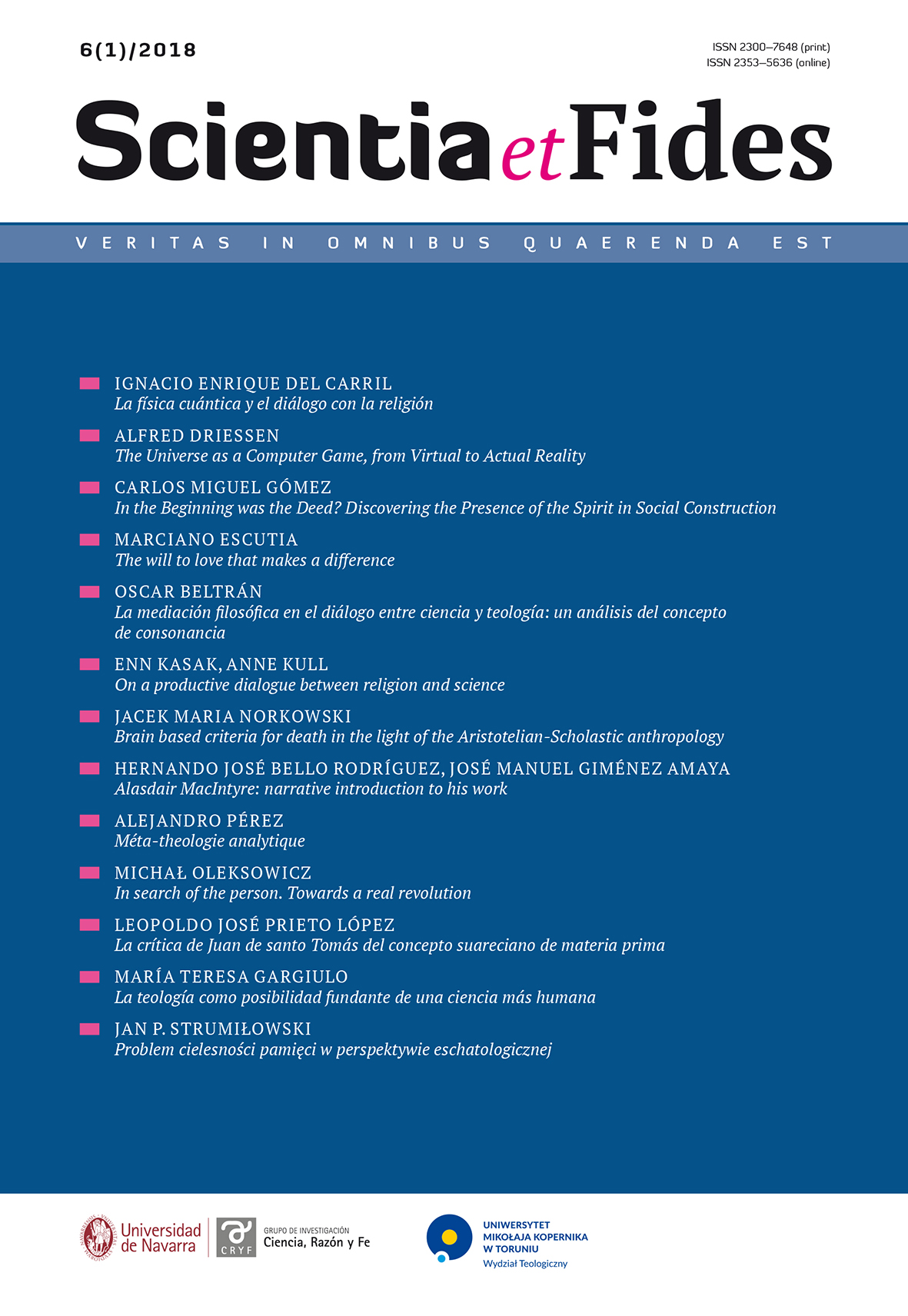The Universe as a Computer Game, from Virtual to Actual Reality
Słowa kluczowe
Philosophy of Science, Hylomorphism, Aristotle, Aquinas, Creation, RationalityAbstrakt
From the very beginning of ancient Greek philosophy up to the present day a puzzling correlation is found between rationality and reality. In this study this relation is examined with emphasis on the philosophical tradition of Aristotle and Aquinas. A comparison is made with the virtual reality created by computers and actual reality of our universe. The view expressed in the scientific neopositivism of Jordan and Mach is found to be an adequate approach to avoid contradictions in the interpretation of modern physics. A challenging hypothesis is made by updating the Laplacian Demon by a powerful creative intellect in line with Judeo-Christian tradition. With this hypothesis a new light is shed on several fundamental issues in modern science.
Bibliografia
Aristotle, Metaphysics, book XII.
Artigas, Mariano. 2002. “The Mind of the Universe: Understanding Science and Religion.” In Faith, Scholarship, and Culture in the 21st Century, edited by Alice Ramos and Marie I. George, 113–125. Washington D.C.: The Catholic University of America Press.
Beiglböck, Wolf, D. 2007. “Ernst Pascual Jordan als Autor wissenschaftlicher und allgemeinbildender Schriften.“ In Pascual Jordan (1902–1980) Mainzer Symposium zum 100. Geburtstag. Max Planck Institute for the History of Science. Preprint 329.
Benedictus XVI. 2006. Address at the University of Regensburg, 12.09.2006.
Berryman, Sylvia. 2016. “Democritus.” In Stanford Encyclopedia of Philosophy, https://plato.stanford.edu/entries/democritus/
Dawkins, Richard. 1986. The blind watchmaker. New York: Norton & Company, Inc.
De Broglie, Louis. 1947. Revue de metaphysique et de morale, 3:278.
Driessen, Alfred. 1995. “The question of the existence of God in the book of Stephen Hawking, A brief history of time.” Acta Philosophica 4:83–93.
Driessen, Alfred and Suarez, Antoine. 1997. “Introduction” and “Final Remarks”. In Mathematical Undecidability, Quantum Nonlocality and the Question of the Existence of God, edited by Alfred Driessen and Antoine Suarez, Springer (Kluwer).
Driessen, Alfred. 2015. “Life and Quantum Biology, an Interdisciplinary Approach.” Acta Philosophica 24:69–86.
Driessen, Alfred. 2016. “The Role of Philosophy as a Guide in Complex Scientific and Technological Processes.” http://philsci-archive.pitt.edu/12446/
Elders, Leo J. 1982. De Metafysica van St. Thomas van Aquino in historisch perspectief. Tabor Brugge, p. 158. For the English translation: The Metaphysics of Being of St. Thomas Aquinas: In a Historical Perspective. Brill, Leiden, New York, Köln, 1993.
Einstein, Albert. 1926. Letter to Max Born.
Fokker, Adriaan D. 1955. “Albert Einstein, 14 maart 1978-18 april 1955.” Nederlands Tijdschrift voor Natuurkunde, 21:125–129.
Gardner, Martin. 1970. “Mathematical Games, The fantastic combinations of John Conway's new solitaire game ‘life’.” Scientific American 223 4:120–123.
Hawking, Stephen. 1988. A brief history of time, from the big bang to black holes. New York: Bantam Books.
Hawking, Stephen. 1999. Does God play Dice? Lecture, published on http://www.hawking.org.uk/does-god-play-dice.html
Jordan, Pascal. 1972: “Neopositivismus und physikalische Erkenntnistheorie“. In Erkenntnis und Besinnung. Oldenburg: Stalling Verlag.
Kelvin, Lord. 1884. Baltimore Lectures on Molecular Dynamics and the Wave Theory of Light (1884 and printed 1904), see also http://todayinsci.com/K/Kelvin_Lord/KelvinLord-Quotations.htm
Laplace, Pierre Simon. 1814. Essai philosophique sur les probabilités. Gauthiers-Villars: Paris, 1921, p. 3.
Laeuffer, Jacques. 1997. “Scientism and Scientific Knowledge of Things and God.” In Mathematical Undecidability, Quantum Nonlocality and the Question of the Existence of God, edited by Alfred Driessen and Antoine Suarez, 185–191. Springer (Kluwer).
Lisska, Anthony, J. 2016. Aquinas's Theory of Perception: An Analytic Reconstruction. Oxford: Oxford University Press.
Llano, Alejandro. 2001. Gnoseology. Manila: Sinag-Tala Publishers Inc.
Lloyd, Seth, 2013. The universe as quantum computer. arXiv:1312.4455.
Nguyen, Knut Vuong. 2015. “Gnoseology: In Relation to Truth, Knowledge and Metaphysics.” PhilPapers, http://philpapers.org/rec/NGUGIR.
Plato. 380 BC. The Republic, book VII.
Polo, Leonardo. 1993. Presente y Futuro del Hombre. 13, Madrid: Ediciones Rialp, Madrid.
Popper, Karl R. 1959. The Logic of Scientific Discovery. Oxford: Routlegde Classics.
Schrödinger, Erwin. 1954. Nature and the Greeks. Cambridge: Cambridge University Press.
Suarez, Antoine. 2015. Unified description of quantum nonlocal and relativistic local correlations: Both assume ‘free will’ and happen without connection in space-time. arXiv:1510.01312v1, 3 Oct. 2015.
Vicente, Agustin. 2006. “On the Causal Completeness of Physics.” International Studies in the Philosophy of Science 20:149–171.
Pobrania
Opublikowane
Jak cytować
Numer
Dział
Licencja
CC BY ND 4.0. Posiadaczem prawa autorskiego (Licencjodawcą) jest Autor, który na mocy umowy licencyjnej udziela nieodpłatnie prawa do eksploatacji dzieła na polach wskazanych w umowie.
- Licencjodawca udziela Licencjobiorcy licencji niewyłącznej na korzystanie z Utworu/przedmiotu prawa pokrewnego w następujących polach eksploatacji: a) utrwalanie Utworu/przedmiotu prawa pokrewnego; b) reprodukowanie (zwielokrotnienie) Utworu/przedmiotu prawa pokrewnego drukiem i techniką cyfrową (e-book, audiobook); c) wprowadzania do obrotu egzemplarzy zwielokrotnionego Utworu/przedmiotu prawa pokrewnego; d) wprowadzenie Utworu/przedmiotu prawa pokrewnego do pamięci komputera; e) rozpowszechnianie utworu w wersji elektronicznej w formule open access na licencji Creative Commons (CC BY-ND 3.0) poprzez platformę cyfrową Wydawnictwa Naukowego UMK oraz repozytorium UMK.
- Korzystanie przez Licencjobiorcę z utrwalonego Utworu ww. polach nie jest ograniczone czasowo ilościowo i terytorialnie.
- Licencjodawca udziela Licencjobiorcy licencji do Utworu/przedmiotu prawa pokrewnego nieodpłatnie na czas nieokreślony
PEŁEN TEKST UMOWY LICENCYJNEJ >>
Statystyki
Liczba wyświetleń i pobrań: 870
Liczba cytowań: 0



